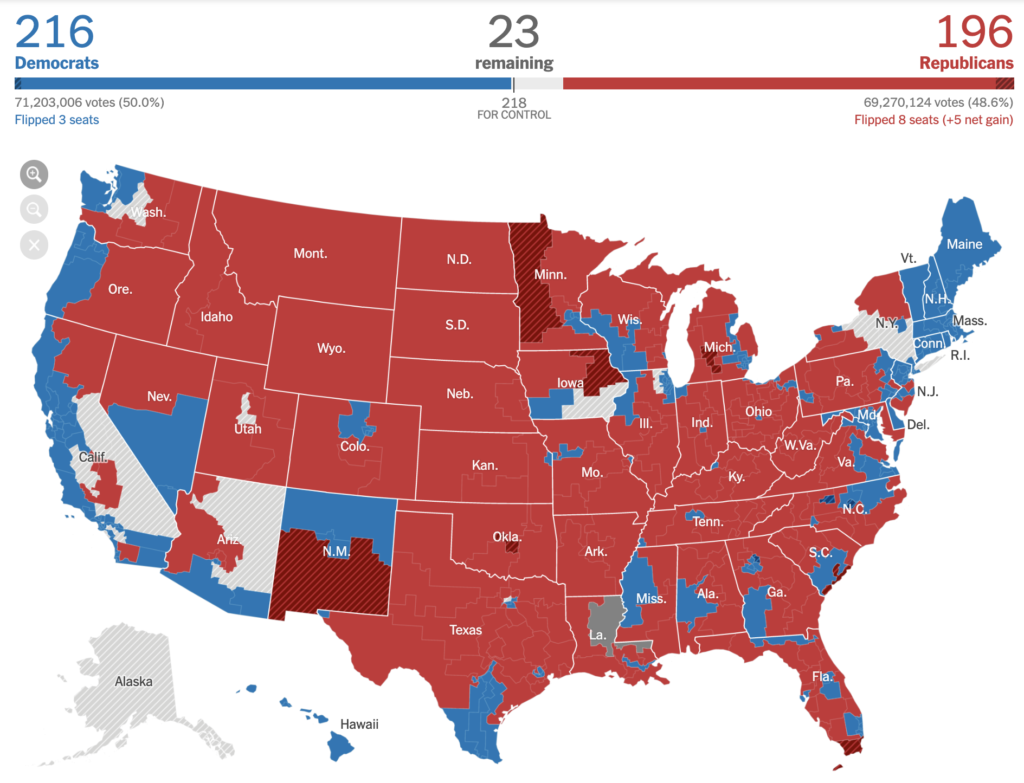Neither Progressives nor Moderates Deserve Blame for 2020 Disappointments

If I could design the American health-care system from scratch, it would combine universal, government-provided insurance with the ability to purchase private, supplemental insurance. In other words, something a lot like the H.R. 1384, or “Medicare for All.”
But I also know that M4A is not a winner for Democrats in more conservative districts, and that the most likely route to truly universal coverage is incremental. Not because on any given day you couldn’t find a majority of poll respondents indicating support for M4A. The combination of malapportionment and veto points in the U.S. political system makes it unlikely that such a majority will translate into the immediate establishment of a single-payer health care system.
For the last day or so, Representative Alexandria Ocasio-Cortez – whom I generally consider an extremely talented politician – has been on a tear against moderate Democrats and #NeverTrumpers. The immediate cause seems to have been moderates blaming progressives for the party’s unexpectedly mediocre performance in swing districts.
I am not sure what purpose any of this serves. I do not see how a lengthy, public airing of grievances helps the progressive cause. It’s not that I think progressives need to stay quiet for the stake of party unity or whatever. There’s simply no upside.
Some of her criticisms may have merit. But others are deeply flawed. For example:
There are a handful of such Democrats who won reelection, most of them in districts with slight Republican leans. So there’s not much of a pattern to extrapolate from. On the other hand, most of the Democrats who won marginal districts did not embrace M4A, and no challenger who embraced M4A won a marginal district.
The problems here is straightforward. Democrats who support M4A in Republican-leaning districts are going to have a harder time winning election in the first place. So we should expect, overall, that Democratic incumbents in GOP-leaning districts won’t support M4A – and that they will be even less likely to do so when support for M4A presents a greater drag on their electoral prospects. Put differently, the causal arrow almost certainly goes the other direction: Democrats, who are more likely to win reelection, all other things being equal, are more likely to support M4A, whether their districts are safe or swingy.
The thing is, progressives should never have needed to defend themselves in the first place. There’s no great mystery why the Democrats lost seats in the House. In 2018, Democrats turned out while Republicans didn’t. This allowed Democrats to gain a significant number of GOP-leaning seats.
2020, in contrast, was an extremely high turnout election. Both sides mobilized a large numbers of low-propensity voters; Biden also made inroads with moderate voters who clearly haven’t yet abandoned the Republican party.
Under these conditions, Republicans will do better than Democrats. Between the geographic concentration of Democratic voters and Republican gerrymandering, there are more congressional districts with a plurality of GOP voters than with a plurality of Democratic voters. To get a rough sense of this, according to the Cook Political Report, there are 192 congressional districts with a PVI of at least Democratic +1, 8 with a PVI of even, and 234 of a PVI of at least R+1 (see comments for why I changed the wording here).
Overall, then, the fact that the Democrats look poised to retain their majority isn’t a bad showing. It only seems like a terrible outcome because of the rising expectations generated by systematic polling errors.*
The bad news is that the topography of the House may look worse for Democrats after the next round of redistricting. A lot depends on whether the courts decide that independent districting commissions are unconstitutional – or even that governors have no say in the process.
The other wild card is whether we’re in the midst of a realignment, which could mess with gerrymandering efforts. How many GOP voters that went for Biden this time are shifting Democratic but haven’t fully changed over yet?** How many will follow them? How many are temporary defectors? Will low-propensity rural and exurban white show up for more orthodox GOP candidates, or for anyone other than Trump? What will we see happen with the various subgroups that make up the “hispanic vote?
The answers to these questions will depend, in no small measure, on the direction of the two major parties. It seems clear, though, that if the Democrats want to compete in the medium-term, they don’t have any choice other to make room for both progressives and moderates.
*The major unforced error, as far as I can tell, involved failing to respond to ongoing GOP disinformation efforts directed at Hispanic (and Vietnamese) voters. There will always be some recruitment mistakes, and some candidates who are ideologically unsuited for their districts.
**It took decades for the Civil Rights realignment to work itself out.
